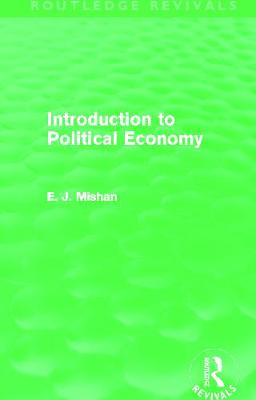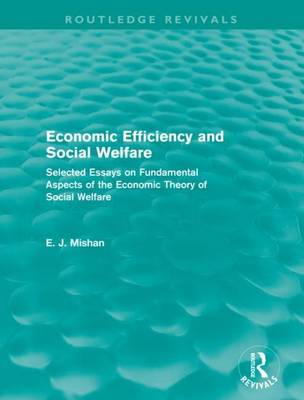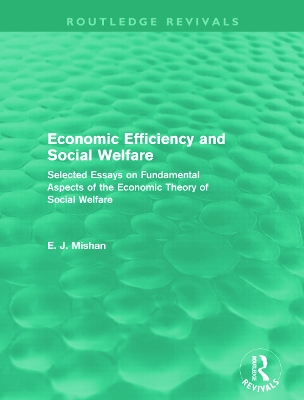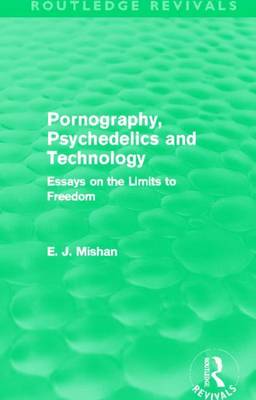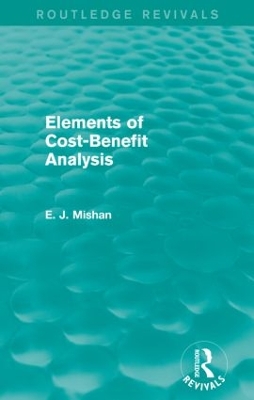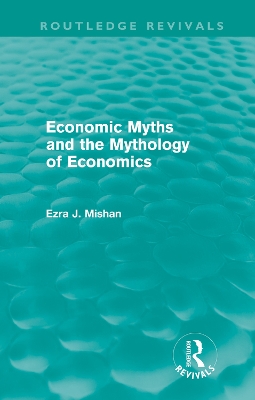Routledge Revivals
8 total works
Economic Efficiency and Social Welfare (Routledge Revivals)
by E. J. Mishan
First published in 1981, Professor Mishan’s Economic Efficiency and Social Welfare: Selected Essays on Fundamental Aspects of the Economic Theory of Social Welfare is a collection of 22 pioneering essays written while the author was teaching at the London School of Economics and chosen to indicate landmarks in the development of his own thought. Professor Mishan, who also enjoys an international reputation as a popular writer on the impact of modern economic growth on social welfare, is among the foremost authorities in the field of resource allocation, and his influence in his subject area has been profound. Mishan’s essays, while generally accessible to the layman due to the author’s lucidity, his economy in the use of mathematical notation and his concern with perspective, are invaluable reading for the economics undergraduate. The essays are particularly relevant to upper level students of project appraisal, welfare economics and cost benefit analysis requiring a coherent survey of their field of study.
Pornography, Psychedelics and Technology (Routledge Revivals): Essays on the Limits to Freedom
by E. J. Mishan
First published in 1980, Pornography, Psychedelics and Technology: Essays on the Limits to Freedom focuses on the crucial connections between technological growth and the more salient features of social malaise in the latter part of the twentieth century. Professor Mishan is one of the few economists absorbed by the larger social questions, and does not believe that the growth in state intervention and the decline of social liberty are simply the result of intellectual confusion and bureaucratic momentum. He sees them as unavoidable consequences of scientific and technical progress. While agreeing with many of his fellow economists in acknowledging the virtues of a competitive market economy, Professor Mishan is acutely aware of its limitations. Following the growth of self-styled liberation movements, seen as manifestations of a move towards a world of greater individual emancipation and fulfilment, the author nevertheless groups such movements together with the rising indices of violence, suicide, family breakdown and hooliganism, which have become indicative of a growing disorientation and social disintegration. These developments and the hazards they entail, however, are bound up with the rapid scientific and technological progress of the post-war world.
Economic Myths and the Mythology of Economics (Routledge Revivals)
by E. J. Mishan
This book, which was first published in 1972, is not a collection of case-studies in cost-benefit analysis, of which there had been already several in use employing techniques of varying degrees of sophistication. Nor is it a manual of instruction with particular orientation for less developed counties, such as those produced under the auspices of the U.N. and the O.E.C.D. What this volume does attempt is to introduce the student of economics to the logic and the concepts used in cost-benefit analysis.
Economic Myths and the Mythology of Economics (Routledge Revivals)
by E. J. Mishan
First published in 1986, Economic Myths and the Mythology of Economics is a polemical study in which the author focuses on the popular myths and misconceptions that colour our understanding of economic issues. Professor Mishan, the internationally recognised economist and expert in the field of resource allocation and cost benefit analysis, undermines the idea that economics is a science. But such are popular myths, he argues, that governments employ battalions of economists in their ongoing attempts to promote economic growth, efficiency and employment. The author challenges the validity and measurement of such concepts as economic efficiency and GNP, and questions the assumption that free competitive markets can operate effectively in a rapidly changing, high-technology society. Professor Mishan foresees in his study further expansion as an unavoidable consequence of continued innovation, while revealing the interconnecting processes by which innovative activity, designed to raise living standards, has begun to erode the moral and psychological foundations of a viable and libertarian society.
